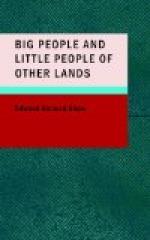Their houses are made of logs of wood set in the ground as posts. They put other logs on top of these for a roof. Then they cover these logs with palm leaves. There are no windows, and they use mats for doors.
They sleep in hammocks. These they make of string. They make the string by twisting the leaves of a tree.
They have plenty of pans and pots, both large and small. These pans and pots they make of clay.
First, they soften the clay and knead it. Then they shape it into pots and pans. It is then dried in the sun. When the pots and pans are dry they are put in a hot fire. This makes them hard and strong.
The chief food of these Indians is a kind of flour made from the root of a plant. They also eat fish. A great many fish are found in the rivers. These they catch and eat. They also dry fish and then smoke them over a fire. The smoked fish keep good a long time.
These Indians sail on the rivers in canoes. But their canoes are heavy. They are not light, as the canoes of our Indians are. They are not made of birch bark.
These Indians make an entire canoe out of a single tree. The canoe is made thick so as not to be broken by knocking against snags and rocks.
***End of the project gutenberg EBOOK big people and little people of other Lands***
******* This file should be named 14655.txt or 14655.zip *******
This and all associated files of various formats will be found in: http://www.gutenberg.org/dirs/1/4/6/5/14655
Updated editions will replace the previous one—the old editions will be renamed.
Creating the works from public domain print editions means that no one owns a United States copyright in these works, so the Foundation (and you!) can copy and distribute it in the United States without permission and without paying copyright royalties. Special rules, set forth in the General Terms of Use part of this license, apply to copying and distributing Project Gutenberg-tm electronic works to protect the project gutenberg-tm concept and trademark. Project Gutenberg is a registered trademark, and may not be used if you charge for the eBooks, unless you receive specific permission. If you do not charge anything for copies of this eBook, complying with the rules is very easy. You may use this eBook for nearly any purpose such as creation of derivative works, reports, performances and research. They may be modified and printed and given away—you may do practically anything with public domain eBooks. Redistribution is subject to the trademark license, especially commercial redistribution.
*** Start: Full license ***
The full project gutenberg license
please read this before you
distribute or use this work




